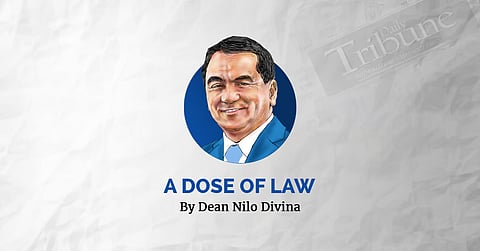
- NEWS
- the EDIT
- COMMENTARY
- BUSINESS
- LIFE
- SHOW
- ACTION
- GLOBAL GOALS
- SNAPS
- DYARYO TIRADA
- MORE

The 2025 midterm election is fast approaching and political candidates are gearing up their campaign mechanisms, such as the production of election paraphernalia. Nevertheless, aside from the candidates themselves, private individuals and/or eligible voters also play a huge role in elections either by voting and/or participating in campaigns in their own way.
One such participation at issue in St. Anthony College of Roxas City Inc. et al. v. Comelec et al. (G.R. No. 258805, 10 October 2023) was the production and display by private individuals of their own election paraphernalia in support of the candidates of their choice and the regulatory limitations thereof.
While the regulation of election paraphernalia produced by political candidates certainly falls under the jurisdiction of the Commission on Elections (Comelec), the extent of the latter’s authority over election paraphernalia owned and displayed by private persons is in question.
The subject of the case is Comelec’s “Oplan Baklas,” pursuant to Sections 21(o), 24 and 26 of Comelec Resolution No. 10730, which gave Comelec officials the authority to remove and confiscate oversized tarpaulins, posters and other campaign materials, including those owned by private individuals and posted within their own premises, residences or establishments.
This then empowered Comelec officials of Roxas City to dismantle, remove, destroy and confiscate the posters, tarpaulins and other campaign materials supportive of former Vice President Leni Robredo that were owned and posted by petitioners St. Anthony College et al. within their own premises.
Essentially, the main issue was whether Comelec had the authority to regulate the expressions made by private individuals within their private property considering that its power to regulate the posting of election propaganda under the Fair Election Act applied only to candidates and political parties.
The Supreme Court resolved the issue in favor of the petitioners and found that Comelec’s implementation of Oplan Baklas with regard to St. Anthony College et al.’s election paraphernalia was unconstitutional.
Considering that the posters and tarpaulins that were the subject of the case are recognized as election paraphernalia primarily intended to endorse a certain candidate, the Court applied the test enunciated in Diocese of Bacolod v. Commission on Elections on the valid regulation of a species of speech of persons who are not candidates or who do not speak as members of a political party. Thus, the regulation a) should be provided by law; b) be reasonable; c) is narrowly tailored to meet the objective of enhancing the opportunity of all candidates to be heard and consider the primacy of the guarantee of free expression; and d) be demonstrably the least restrictive means to achieve that objective.
As applied in the case, since the posters and tarpaulins were not produced or displayed “by or on behalf of and in coordination with candidates or political parties” but were the result of privately funded initiatives and were displayed willingly by the petitioners on their own private property, they are beyond the scope of the size restrictions under the Fair Election Act. To apply the size restrictions to political speech of private persons unlawfully expands the express reference of the law to candidates and political parties only.
Moreover, Section 82 of the Omnibus Election Code cannot be the basis for such action by the Comelec as such provision has been impliedly repealed by the provisions of the Fair Election Act as the provisions of the two election laws are irreconcilably inconsistent and cannot be enforced altogether.
In truth, the Fair Election Act, the later law, limits the definition of election propaganda to materials paid for and displayed by candidates and political parties.
For more of Dean Nilo Divina’s legal tidbits, please visit www.divinalaw.com. For comments and questions, please send an email to cad@divinalaw.com.
